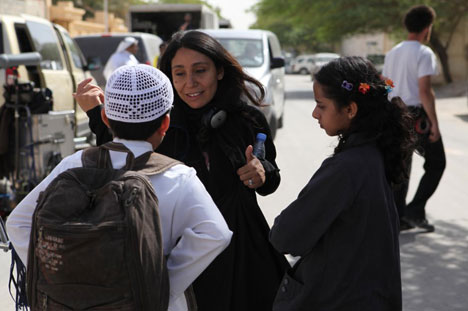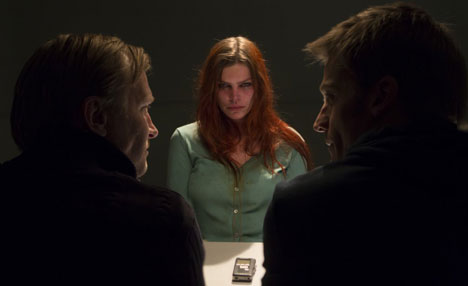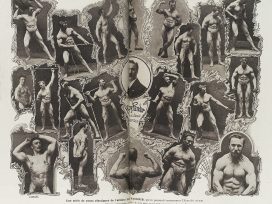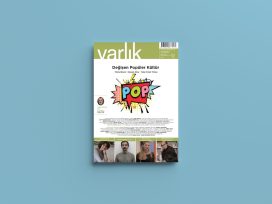Haifaa Al Mansour became Saudi Arabia’s first female feature-film director with Wadjda, her 2012 film about a young girl who covets a bicycle and goes to great lengths to obtain it. “I want to tell stories and make entertaining films, which in itself is a challenge to cultural taboos in Saudi Arabia”, she said. “But I am not an activist, I’m a filmmaker, and I prefer to engage in dialogue with people who disagree with me. Taboos become ingrained in a culture, and changing our collective perceptions of them is a very difficult process”.

Still of Haifaa Al-Mansour, Waad Mohammed and Abdullrahman Al Gohani in(2012). Photo: Razor Film / Sony Pictures Classics. Source: IMDb
In making Wadjda, Al Mansour didn’t only have to deal with restrictions over subject matter, but the entire filmmaking process was dictated by prohibitive social customs. “Most of the cultural taboos that I faced were in the production of the film itself,” the director said. “Gender segregation, filmmaking and promoting the arts were big issues in getting the film made”.
“People aren’t used to having cameras around, so we were especially cautious”, she added. “I occasionally directed from a protected spot, like a van, so people wouldn’t see me, a woman, interacting publicly with the all-male crew”.
Despite the fact that Al Mansour was challenging the country’s deepest traditions, she was determined to make a film that would be embraced by Saudi audiences. “I didn’t set out to make films to offend people”, she said. “Having grown up in Saudi Arabia, there was always an understanding of where the red lines are within the culture. I wanted the average Saudi person – someone who has not travelled outside the region, someone with traditional values – to see my film, and I knew that certain things would lose them automatically. Not just sex, violence, profanity, but the way you package your ideas. If you try to be confrontational, or scream at them about how stupid you think they are, you aren’t going to get through to them. You have to be respectful of the world they come from and present your ideas through that prism”.
In making Wadjda, Al Mansour was aware that it would also need to connect with a less conservative international audience. “As the script developed, I continually tried to look at it from the outside, and the universal themes it spoke to”, she said. “I didn’t want to give foreign audiences the false impression that it would be an easy or acceptable thing for a girl to ride a bike around Riyadh, so it was hard not to put a bleaker end on her journey. But the positive aspects of the film help audiences relate to the story, and ultimately enjoy the film”.
Al Mansour’s determination to make Wadjda resonate with both Saudi and international audiences was rewarded with success. The film was chosen as Saudi Arabia’s first-ever submission to the Academy Awards, and was nominated for awards from industry bodies, critics groups and festivals across the globe. “For me, there is nothing more rewarding than to see people all around the world finding points of commonality in the story”, she said. “I have also been happy to see Saudis turn up at screenings all around the word. One Saudi student told me: ‘Now I know how Americans feel when they watch an American film.’ That really made me proud and emotional. I have also had a lot of positive feedback from young Saudi women; it means so much to me when they say how much they loved and related to the film.”
For now, Al Mansour is preparing to shoot US drama A Storm in the Stars, and described working in the USA as “a very different environment”. One thing, however, has struck her as familiar. “I think there are always issues of women taking on leadership roles and managing people, which can be a bit difficult even in the West, but I have been fortunate to be part of supportive team on this project. I am very happy to be out of the van!”
* * *
“I’ve never made a film that has divided an audience to such an extreme”, said Danish director Susanne Bier about her latest title, A Second Chance. Bier has built a career out of compelling drama, with films including Brothers, After the Wedding and the Oscar-winning In A Better World examining the intricacies of family relationships through such prisms as terminal illness, religion, post-traumatic stress, disability and sexuality.
Yet with A Second Chance she confronted what she believes to be one of the most deeply rooted social taboos: the sanctity of motherhood. “This is a taboo which is so fundamental to our society”, she said. “And it’s not something you get away with lightly”.
Indeed, reaction to the drama has been vehement, with audiences either applauding or dismissing its unflinching look at maternal despair. FlickFilosopher‘s MaryAnn Johanson, for example, described the film as “a triumph not only of emotionally devastating human drama but of cultural provocation”, while Time Out London‘s Dave Calhoun observed that its “thriller tendencies are as halfcocked as its compassion for the struggles of parenthood”.

Still of May Andersen in(2014). Photo: Rolf Konow / Zentropa Entertainments. Source: IMDb
Through this powerful story of two women on opposite sides of a class divide struggling to cope with the demands of parenthood, Bier and writer Anders Thomas Jensen dismantle the traditional sanctity of motherhood by tackling the horrifying abuse that children can suffer at the hands of mothers ill-equipped to care for them.
“The subject matter certainly makes people frightened, as it goes against the perception that motherhood is natural to all of us”, Bier told Index. “It’s much easier to talk about virtually everything else; being unfaithful, for example, is much less of a taboo. But how can you go and tell your friends that you don’t feel happy as a mother, that you have a hard time connecting to your child? It’s a really shameful thing to talk about, and so it’s a movie that most people have a very emotional reaction to – whether they like it or not.”
A Second Chance is also unusual for the striking characterization of a father whose love for his own child leads him down a very dark emotional path, forcing him to get deeply, personally involved in the appalling case of a neglected baby his police unit are investigating. And while the conflicted male is still considered something of a cinematic taboo – modern on-screen men tend to be heroes of the stiff-upper-lip variety – Bier has never shied away from showcasing masculine vulnerability. “The interesting thing about A Second Chance is that the emotions of the father are replacing the conventional emotions that we generally associate with a mother”, she said. “For once we have a father who is incredibly emotionally attached to a very young child, which I can’t remember having seen on film before”.
For Bier, exploring controversial issues is not about being deliberately incendiary, it is about challenging the audience’s perception of what they consider to be taboo. “Movies have always been a mass media, but that doesn’t necessarily mean that all movies have to address a huge audience”, she said. “They need to communicate their ideas effectively. A lot of my films have had issues at their core, which, from a commercial point of view, could be of huge concern, but they all had a big local audience. Part of the excitement of being artistic is to push against boundaries, and the challenge for me has been to tackle potentially difficult subject matter in a way which does not alienate the audience”.








